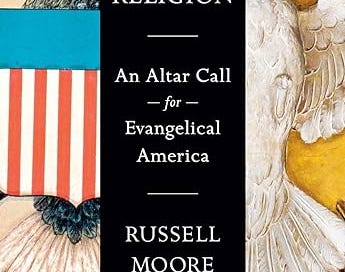Did Russell Moore Lose His Religion 40 Years Too Late?
An essay on Russell Moore and his new book Losing Our Religion: An Altar Call for Evangelical America
Did Russell Moore Lose His Religion 40 Years Too Late?
Or was his response to altar calls as a young person in his low-church Mississippi Baptist congregation exactly on time for his personal faith development?
All the altar call responses he made—likely in the 1970s and 1980s—were also mine as a seven-, ten-, and 12-year-old in a somewhat higher-church Maryland Baptist congregation in the 1950s and 1960s.
I am about 20 years older than Russell. I wish that he was my age, and he had the same type of de-denominationalizing insights around 1980 that he had around 2020. At this latter time, after a couple of decades deep into denominational ministry among Southern Baptists (SBC), he became the target of attacks by SBC insiders. He then left Southern Baptist life.
What If?
He would have been a key voice for evangelical denominational transformation. But it is too late now. Even the post-denominational era that started in the 1960s, and developed real momentum in the 1980s, is waning. The non-denominational era has taken its place.
I suggest Russell would have liked many of the characteristics of the pre-1980’s SBC denomination. Not all. But many. His classic Mississippi conservatism and the likely cultural captivity of his youth would have put him with odds with some SBC characteristics in the 1960s and 1970s.
For example, would he be pro-early term abortion as Southern Baptists were in the early 1970s—aided by the public stances of W.A. Criswell—or anti-early term abortion as Southern Baptists were moving to become by the end of that decade—aided by Southern Baptist outsider Jerry Falwell?
We cannot know. Not even Russell can know today how different his perspectives would be if he had been born in 1951 rather than 1971 and experienced the pre-1980s SBC.
The Book
Russell Moore’s rambling book, Losing Our Religion: An Altar Call for Evangelical America (Sentinel, 2023), is a cathartic narrative for his separation from denominational Christian religion to parachurch, non-denominational Christian religion.
It is rambling as he writes on-and-on about a specific idea. Occasionally, breaking his concept presentation into multiple paragraphs. While at the same time asking us to endure 400- and 500-word paragraphs and the under-utilization of subheadings that would make the book more readable.
For those who do not know, yes, he has a preacher and academic research and teaching background that at times leads people to ramble.
It is a cathartic narrative in that the knowing reader can truly feel his pain over losing his institutionalized religion and his yearning for evangelicals to find a more engaging and pure voice for talking about the gospel.
It is parachurch and non-denominational in that he ended up at a parachurch organization—Christianity Today—and he is a member of a non-denominational church.
He is now a key influencer in the ever-stronger parachurch and non-denominational movement in North America. A maven of ecumenical and interfaith conversations with various people and organizations outside of Christianity.
One Liners
Amidst his ramblings in Losing Religion are some great one liners. You must dig for them or slow down to find them. Here is a sampling of my favorites:
· “Abuse of power is always horrific; how much worse, though, when the abuse comes by a weaponized spiritual authority.” (17)
· “Almost any disconnection of people from organic community leads to extremism and anger—no matter the place on the ideological spectrum.” (38)
· “What if people don’t leave the church because they disapprove of Jesus, but because they’ve read the Bible and have come to the conclusion that the church itself would disapprove of Jesus? What a catastrophe.” (44-45)
· “Christian nationalism is not a politically enthusiastic version of Christianity, nor is it a religiously informed patriotism. Christian nationalism is a prosperity gospel for the nation-states, a liberation theology for white people” (117)
· “It’s not unusual for a church to wonder whether a youth minister is going liberal on them, or sometimes maybe even the preacher. But when a church decides Jesus might be going liberal, we are really entering a new era.” (155)
· “Sometimes unity becomes a way to appease the loudest and angriest voices while silencing those who have no voice.” (222)
Me and Russell
You might ask, “Do I like or hate Russell?”
Oh, I very much like him although I have never met him.
I am a person with a great tolerance for diversity of viewpoints. I listen to two podcasts weekly where he is a key speaker. I am informed by him. I learn from him. I agree with much—not all—he has to say.
I just think he would have made a great contribution to the dialogue turned debate turned divisive among Southern Baptists in the 1980s. You remember that decade, do you not?
It is the one where Southern Baptists moved from what is right—fulfilling the Great Commission in the spirit of the Great Commandment through bold endeavors, to who is right and will control the direction of what by the mid-1980s—if you count active participation in congregations—became a plateaued denomination and a decade or two later a declining denomination.





You have to wonder how he would have turned out if he had gone to SBTS for M.Div AND Ph.D. SBTS had a way of changing low-church conservatism for some, George.